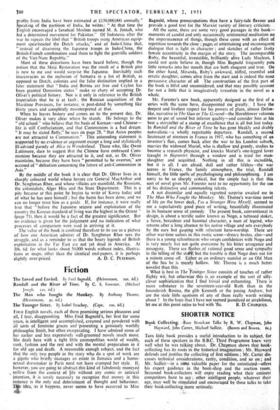Fiction
Joseph. los. 6d.) The Younger Sister. By Isobel Strachey. (Cape. cos. 6d.)
FOUR English novels, each of them promising serious pleasures and all, I fear, disappointing. Miss Enid Bagnold's, her first for some years, is intelligent and accomplished, creamed and powdered with all sorts of feminine graces and 'presenting a genuinely worldly philosophic finish, but often exasperating. I have admired some of her earlier and less expensively well-groomed novels much more. She deals here with a tight little cosmopolitan world of wealth, rank, fashion and the rest and with the mental preparation in it for old age and death. A reasonable enough subject, and the fact that the only two people in the story who do a spot of work are a gigolo who briefly .manages an estate in Jamaica and a homo- sexual dressmaker in Paris need not have cramped her style. lf, however, you are going to abstract, this kind of fabulously moneyed milieu from the context of life without any comic or satirical intention, it is surely necessary to recognise that money in this instance is the only real determinant of thought and behaviour.
idea, as it happens, never seems to have occurred to Miss Bagnold, whose preoccupations thus have a fairy-tale flavour and provide a good text for the Marxist variety of literary criticism.
All the same, there are some very good passages in the book— moments of candid and only occasionally sentimental meditation on the impermanence of things, though these come with an effect of repetition towards the close ; pages of entertaining and inconsequent dialogue that is light in character ; and sketches of rather fruity female eccentricity in the margin of the story. The incomparable Ruby, the beautiful, irresistible, brilliantly alive Lady Maclean, could not quite believe in, though Miss Bagnold frequently puts little remarks into her mouth that are both eloquent and true. On the other hand, Miranda, Ruby's awkward, stifled, resentful and erratic daughter, comes alive from the start and is indeed the most persuasive character of all. The construction of the first part of the book is fitful and unconsidered, and that may possibly account for not a little that is imaginatively irresolute in the novel as a whole.
Mr. Forester's new book, apparently designed as the first of a series with the same hero, disappointed me greatly. I have the deepest and liveliest respect for his powers of plain, almost Defoe- like, narrative in The Gun or The General—the Hornblower volumes seem to pie of sound but inferior quality—and consider him at his best a storyteller of a stamp of excellence that is all but lost today. In Randall and the River of Time he has gone bleakly and drably naturalistic—a wholly regrettable departure. Randall, a second lieutenant of nineteen in France in 1917, who has something of an inventor's flair, comes back after the war to his London suburb, marries the widowed Muriel, who is shallow and greedy, studies to become a research physicist, and knocks Muriel's one-legged lover (caught in flagrance) through a window and is tried for man- slaughter and acquitted. Nothing in all this is incredible, but it is all, I am afraid, dull and rather lifeless—the war scenes in France, the family • atmosphere, the trial, Randall himself, the little spells of psychologising and philosophising. I am sorry to be so sharply critical, but the simple fact is that this sort of novel gives Mr. Forester next to no opportunity for the use of his distinctive and commanding talents.
A not dissimilar and equally regretted surprise awaited me in The Man Who Fought the Monkey. Mr. Thorne's war-time novel of life _on the lower deck, I'm a Stranger Here Myself, seemed to me a superlatively good piece of writing, beautifully illuminated in its humane sense of comedy. The present book, conventional in design, is about a terrific sailor known as Nogo, a tattooed stoker, a fierce, herculean and haunted character, a man of legend, who returns after a long absence to his native village and sets everybody by the ears but gasping with reluctant hero-worship. There are other war-time sailors in this rustic scene—dreary brutes, alas—and there is a young schoolmarm who swaps confidences with Nogo and is very nearly but not quite overcome by his bitter arrogance and misogyny. There are flashes .of rational good sense and sympathy in the telling of the skint, but the trouble is that Nogo does not for a minute come off. Either as an ordinary matelot or an Old Man of the Sea he is merely hollow. Mr. Thorne is a much better novelist than this.
What is best in The Younger Sister consists of touches of rather flighty wit, but otherwise this is an example of the sort of silly- clever sophistication that I find trivial and exhausting. There is more substance in the seventeen-year-old Ruth than in the bounderish Rosina, the glib Kenneth or the posing Andrew, but are the stale little egotisms of any of them really worth writing about ? In the hope that I have not seemed jaundiced or atrabilious,
let me at this point retire to bed with 'flu. R.- D. CHARQUES.


































 Previous page
Previous page